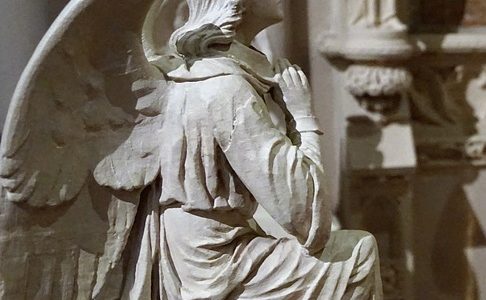Luke 1:26-35
26 In the sixth month the angel Gabriel was sent by God to a town in Galilee called Nazareth, 27to a virgin engaged to a man whose name was Joseph, of the house of David. The virgin’s name was Mary. 28And he came to her and said, ‘Greetings, favoured one! The Lord is with you.’ 29But she was much perplexed by his words and pondered what sort of greeting this might be. 30The angel said to her, ‘Do not be afraid, Mary, for you have found favour with God. 31And now, you will conceive in your womb and bear a son, and you will name him Jesus. 32He will be great, and will be called the Son of the Most High, and the Lord God will give to him the throne of his ancestor David. 33He will reign over the house of Jacob for ever, and of his kingdom there will be no end.’ 34Mary said to the angel, ‘How can this be, since I am a virgin?’ 35The angel said to her, ‘The Holy Spirit will come upon you, and the power of the Most High will overshadow you; therefore the child to be born will be holy; he will be called Son of God.’
The verse we are looking at today is associated with a song, a traditional Basque carol called “The Angel Gabriel.”
Many people nowadays think this song was written by Sting. In fact, the words were written by Sabine Baring-Gould, a folklorist and expert on werewolves who is probably best known for writing “Onward Christian Soldiers” to a tune by his friend Arthur Sullivan, of Gilbert and Sullivan fame. Sullivan never intended to be famous for his comic operettas and that one now-controversial hymn. He thought his opera “Ivanhoe” and other serious works would be his claim to fame. Baring-Gould never, I am sure, expected that the little poem he wrote for a kids’ processional would be the thing he was remembered for.
The tune is “Gabriel’s Message,” an old Basque tune. It is properly an Advent song, not a Christmas carol. Like most old French music for the holidays, though, it is suited to dancing, which makes it a carol, even though it is an Advent carol.
Sting recorded it, and so have a number of choirs and classical musicians of various flavors.
The song tells the story of the visit of the angel Gabriel to Mary. He showed up with his eyes aflame and told her that she would bear God’s son, which must have been a bit of a facer. But the Bible verse tells us that Mary was merely “perplexed,” not terrified as many of us would have been.
Mary, Baring-Gould, and even Arthur Sullivan all had expectations for their lives, and all of them were surprised by how things actually turned out. During Advent, we may have our own expectations about how things will go, and we may end up surprised.
We know that Christ the Babe was born for us, and that we will wait for His return and see it foreshadowed in the Christmas story…but perhaps this year we will also have some surprises.
Lord, let us be open to your surprises in our lives this season. Amen.
Contributed by Rebecca Haden.


